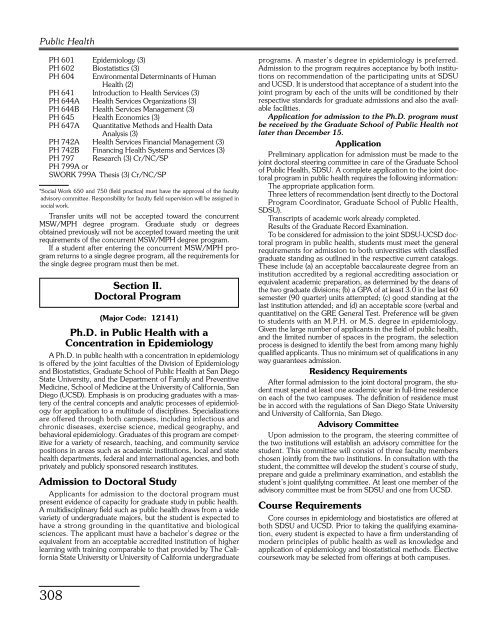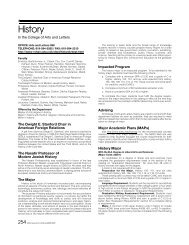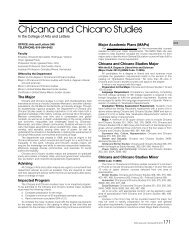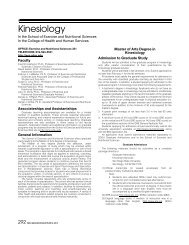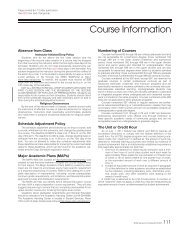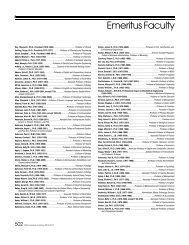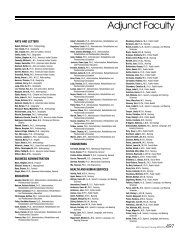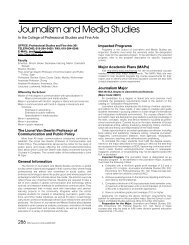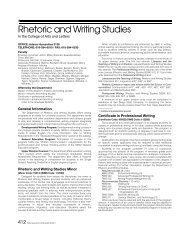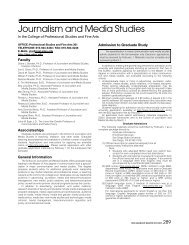President Stephen L. Weber - San Diego State University ...
President Stephen L. Weber - San Diego State University ...
President Stephen L. Weber - San Diego State University ...
You also want an ePaper? Increase the reach of your titles
YUMPU automatically turns print PDFs into web optimized ePapers that Google loves.
Public Health<br />
PH 601 Epidemiology (3)<br />
PH 602 Biostatistics (3)<br />
PH 604 Environmental Determinants of Human<br />
Health (2)<br />
PH 641 Introduction to Health Services (3)<br />
PH 644A Health Services Organizations (3)<br />
PH 644B Health Services Management (3)<br />
PH 645 Health Economics (3)<br />
PH 647A Quantitative Methods and Health Data<br />
Analysis (3)<br />
PH 742A Health Services Financial Management (3)<br />
PH 742B Financing Health Systems and Services (3)<br />
PH 797 Research (3) Cr/NC/SP<br />
PH 799A or<br />
SWORK 799A Thesis (3) Cr/NC/SP<br />
*Social Work 650 and 750 (field practica) must have the approval of the faculty<br />
advisory committee. Responsibility for faculty field supervision will be assigned in<br />
social work.<br />
Transfer units will not be accepted toward the concurrent<br />
MSW/MPH degree program. Graduate study or degrees<br />
obtained previously will not be accepted toward meeting the unit<br />
requirements of the concurrent MSW/MPH degree program.<br />
If a student after entering the concurrent MSW/MPH program<br />
returns to a single degree program, all the requirements for<br />
the single degree program must then be met.<br />
Section II.<br />
Doctoral Program<br />
(Major Code: 12141)<br />
Ph.D. in Public Health with a<br />
Concentration in Epidemiology<br />
A Ph.D. in public health with a concentration in epidemiology<br />
is offered by the joint faculties of the Division of Epidemiology<br />
and Biostatistics, Graduate School of Public Health at <strong>San</strong> <strong>Diego</strong><br />
<strong>State</strong> <strong>University</strong>, and the Department of Family and Preventive<br />
Medicine, School of Medicine at the <strong>University</strong> of California, <strong>San</strong><br />
<strong>Diego</strong> (UCSD). Emphasis is on producing graduates with a mastery<br />
of the central concepts and analytic processes of epidemiology<br />
for application to a multitude of disciplines. Specializations<br />
are offered through both campuses, including infectious and<br />
chronic diseases, exercise science, medical geography, and<br />
behavioral epidemiology. Graduates of this program are competitive<br />
for a variety of research, teaching, and community service<br />
positions in areas such as academic institutions, local and state<br />
health departments, federal and international agencies, and both<br />
privately and publicly sponsored research institutes.<br />
Admission to Doctoral Study<br />
Applicants for admission to the doctoral program must<br />
present evidence of capacity for graduate study in public health.<br />
A multidisciplinary field such as public health draws from a wide<br />
variety of undergraduate majors, but the student is expected to<br />
have a strong grounding in the quantitative and biological<br />
sciences. The applicant must have a bachelor’s degree or the<br />
equivalent from an acceptable accredited institution of higher<br />
learning with training comparable to that provided by The California<br />
<strong>State</strong> <strong>University</strong> or <strong>University</strong> of California undergraduate<br />
308<br />
programs. A master’s degree in epidemiology is preferred.<br />
Admission to the program requires acceptance by both institutions<br />
on recommendation of the participating units at SDSU<br />
and UCSD. It is understood that acceptance of a student into the<br />
joint program by each of the units will be conditioned by their<br />
respective standards for graduate admissions and also the available<br />
facilities.<br />
Application for admission to the Ph.D. program must<br />
be received by the Graduate School of Public Health not<br />
later than December 15.<br />
Application<br />
Preliminary application for admission must be made to the<br />
joint doctoral steering committee in care of the Graduate School<br />
of Public Health, SDSU. A complete application to the joint doctoral<br />
program in public health requires the following information:<br />
The appropriate application form.<br />
Three letters of recommendation (sent directly to the Doctoral<br />
Program Coordinator, Graduate School of Public Health,<br />
SDSU).<br />
Transcripts of academic work already completed.<br />
Results of the Graduate Record Examination.<br />
To be considered for admission to the joint SDSU-UCSD doctoral<br />
program in public health, students must meet the general<br />
requirements for admission to both universities with classified<br />
graduate standing as outlined in the respective current catalogs.<br />
These include (a) an acceptable baccalaureate degree from an<br />
institution accredited by a regional accrediting association or<br />
equivalent academic preparation, as determined by the deans of<br />
the two graduate divisions; (b) a GPA of at least 3.0 in the last 60<br />
semester (90 quarter) units attempted; (c) good standing at the<br />
last institution attended; and (d) an acceptable score (verbal and<br />
quantitative) on the GRE General Test. Preference will be given<br />
to students with an M.P.H. or M.S. degree in epidemiology.<br />
Given the large number of applicants in the field of public health,<br />
and the limited number of spaces in the program, the selection<br />
process is designed to identify the best from among many highly<br />
qualified applicants. Thus no minimum set of qualifications in any<br />
way guarantees admission.<br />
Residency Requirements<br />
After formal admission to the joint doctoral program, the student<br />
must spend at least one academic year in full-time residence<br />
on each of the two campuses. The definition of residence must<br />
be in accord with the regulations of <strong>San</strong> <strong>Diego</strong> <strong>State</strong> <strong>University</strong><br />
and <strong>University</strong> of California, <strong>San</strong> <strong>Diego</strong>.<br />
Advisory Committee<br />
Upon admission to the program, the steering committee of<br />
the two institutions will establish an advisory committee for the<br />
student. This committee will consist of three faculty members<br />
chosen jointly from the two institutions. In consultation with the<br />
student, the committee will develop the student’s course of study,<br />
prepare and guide a preliminary examination, and establish the<br />
student’s joint qualifying committee. At least one member of the<br />
advisory committee must be from SDSU and one from UCSD.<br />
Course Requirements<br />
Core courses in epidemiology and biostatistics are offered at<br />
both SDSU and UCSD. Prior to taking the qualifying examination,<br />
every student is expected to have a firm understanding of<br />
modern principles of public health as well as knowledge and<br />
application of epidemiology and biostatistical methods. Elective<br />
coursework may be selected from offerings at both campuses.


